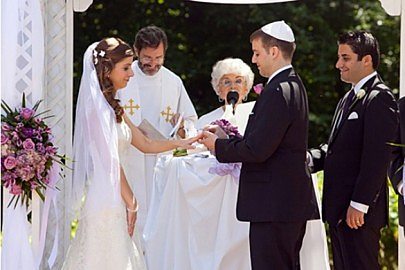September 30, 2013
“Marry your own.” That was my mother’s advice about marriage to anyone who would listen. When we would protest, “No, you have to marry the person you love,” she would only reply: “The more you have in common when you marry, the better off you’ll be during your marriage.” Mom was insistent that Irish folks should marry Irish folks, Catholics should marry Catholics, and well-educated folks should marry well-educated folks. She knew the reality that it didn’t always happen, but she stuck to her guns and urged similarity of anyone who would listen.
Currently, I’m reading a book that speaks to the issue. It’s called, “Till Faith Do Us Part,” by Naomi Schaeffer Riley. Ms. Riley is not urging as my mother did, that one marries one’s own, but she does explore what happens when couples marry who share different faiths. She notes, “Despite the widespread acceptance of interfaith marriage, a higher percentage of married Americans believe it is “very important” for a happy marriage that a husband and wife have the same religion (21 percent) than say they should have the same level of education, the same race, or the same political views. They seem aware that the more a couple has in common, the more likely their marriage will be to succeed.”
So, why then do we have so many interfaith marriages? Basically, Ms. Riley points out, interfaith marriages often come about because of the reality of “the cultural pressure of pluralism.” How un-American is it to think we would eliminate anyone from becoming a potential marriage partner? Interfaith marriage is a prominent part of our world these days. Muslims marry Christians; Christians marry Jews; Orthodox Christians marry Protestants; Protestants marry Catholics in increasing numbers. Ms. Riley points out that when people were asked in one of her surveys what was most important – for a husband and wife to have the same religion or to share common values – the majority (70 percent) chose common values as the most important reality for successful marriage. While couples often recognize the importance of a couple being of the same faith, they are not willing to put religion ahead of “common values” which is a much more inclusive sounding phrase.
Here at the Cathedral St. Andrew in Grand Rapids, we welcome interfaith couples who are considering marriage. Our hope is that such couples will recognize that when they become parents it is important for their children to be brought up in a faith that will give them a set of values and a relationship with God as they grow older. We ask that the Catholic partner of the marriage agree to do all they can to be sure that the children are raised Catholic. That is a far cry from the time when the Catholic Church asked the partner of another faith to pledge to insure Catholic children in an interfaith marriage with a Catholic spouse. We are grateful to the Second Vatican Council for that change.
Interfaith marriages bring challenges to couples that couples of the same faith will not have as frequently. But it’s my hope that those who are involved in interfaith relationships will recognize that our Church welcomes them and hopes to assist them in their marital preparation and journey in a welcoming and thoughtful appreciation of their concerns and love for one another.
(Photo courtesy of The Wedding Yentas)
